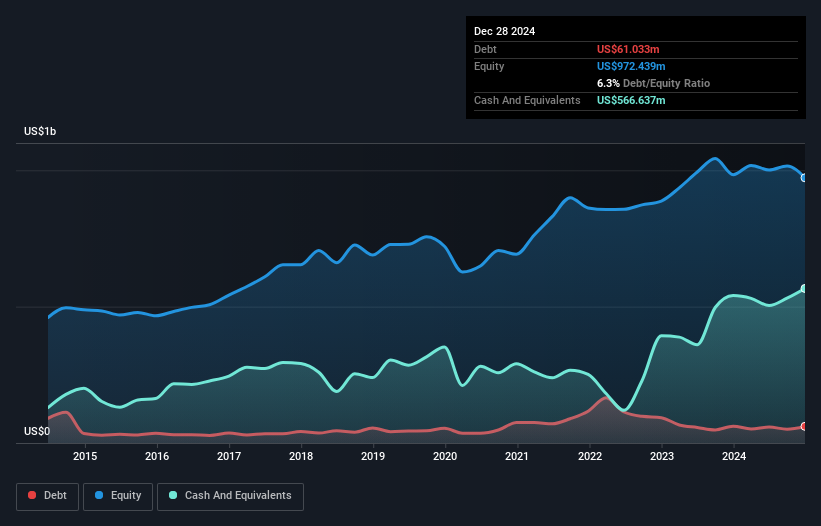Landstar System (NASDAQ:LSTR) Has A Pretty Healthy Balance Sheet
Warren Buffett famously said, 'Volatility is far from synonymous with risk.' It's only natural to consider a company's balance sheet when you examine how risky it is, since debt is often involved when a business collapses. As with many other companies Landstar System, Inc. (NASDAQ:LSTR) makes use of debt. But is this debt a concern to shareholders?
When Is Debt A Problem?
Debt and other liabilities become risky for a business when it cannot easily fulfill those obligations, either with free cash flow or by raising capital at an attractive price. In the worst case scenario, a company can go bankrupt if it cannot pay its creditors. However, a more frequent (but still costly) occurrence is where a company must issue shares at bargain-basement prices, permanently diluting shareholders, just to shore up its balance sheet. Having said that, the most common situation is where a company manages its debt reasonably well - and to its own advantage. The first step when considering a company's debt levels is to consider its cash and debt together.
What Is Landstar System's Net Debt?
The chart below, which you can click on for greater detail, shows that Landstar System had US$61.0m in debt in December 2024; about the same as the year before. But on the other hand it also has US$566.6m in cash, leading to a US$505.6m net cash position.

How Strong Is Landstar System's Balance Sheet?
The latest balance sheet data shows that Landstar System had liabilities of US$673.2m due within a year, and liabilities of US$167.7m falling due after that. On the other hand, it had cash of US$566.6m and US$731.0m worth of receivables due within a year. So it can boast US$456.8m more liquid assets than total liabilities.
This surplus suggests that Landstar System has a conservative balance sheet, and could probably eliminate its debt without much difficulty. Succinctly put, Landstar System boasts net cash, so it's fair to say it does not have a heavy debt load!
See our latest analysis for Landstar System
In fact Landstar System's saving grace is its low debt levels, because its EBIT has tanked 27% in the last twelve months. When a company sees its earnings tank, it can sometimes find its relationships with its lenders turn sour. When analysing debt levels, the balance sheet is the obvious place to start. But ultimately the future profitability of the business will decide if Landstar System can strengthen its balance sheet over time. So if you're focused on the future you can check out this free report showing analyst profit forecasts .
Finally, a company can only pay off debt with cold hard cash, not accounting profits. Landstar System may have net cash on the balance sheet, but it is still interesting to look at how well the business converts its earnings before interest and tax (EBIT) to free cash flow, because that will influence both its need for, and its capacity to manage debt. Happily for any shareholders, Landstar System actually produced more free cash flow than EBIT over the last three years. That sort of strong cash generation warms our hearts like a puppy in a bumblebee suit.
Summing Up
While we empathize with investors who find debt concerning, you should keep in mind that Landstar System has net cash of US$505.6m, as well as more liquid assets than liabilities. The cherry on top was that in converted 105% of that EBIT to free cash flow, bringing in US$256m. So we are not troubled with Landstar System's debt use. Of course, we wouldn't say no to the extra confidence that we'd gain if we knew that Landstar System insiders have been buying shares: if you're on the same wavelength, you can find out if insiders are buying by clicking this link .
At the end of the day, it's often better to focus on companies that are free from net debt. You can access our special list of such companies (all with a track record of profit growth). It's free.
Have feedback on this article? Concerned about the content? Get in touch with us directly. Alternatively, email editorial-team (at) simplywallst.com.
This article by Simply Wall St is general in nature. We provide commentary based on historical data and analyst forecasts only using an unbiased methodology and our articles are not intended to be financial advice. It does not constitute a recommendation to buy or sell any stock, and does not take account of your objectives, or your financial situation. We aim to bring you long-term focused analysis driven by fundamental data. Note that our analysis may not factor in the latest price-sensitive company announcements or qualitative material. Simply Wall St has no position in any stocks mentioned.
 Wall Street Journal
Wall Street Journal